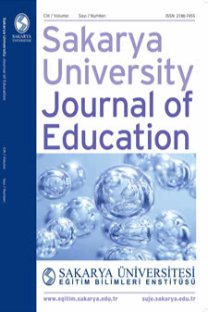An Investigation of Pre-Service and In-Service Teachers’ Perceptions of Teacher Quality in Turkey
in-service teacher, pre-service teacher, teacher education,
___
- Akyüz, Y. (2009). Türk Eğitim Tarihi. Pegem Akademi, Ankara. Ata, Bahri (2001). 1924 Türk basını ışığında Amerikalı eğitimci John Dewey’in Türkiye seyahati, Gazi Eğitim Fakültesi Dergisi, 21(3).
- Bozdoğan, A. E., Aydın, D. & Yıldırım, K. (2007). Öğretmen adaylarının öğretmenlik mesleğine ilişkin tutumları, Ahi Evran Üniversitesi Kırşehir Eğitim Fakültesi Dergisi (KEFAD), 8(2).
- Büyüköztürk, Ş., Kılıç-Çakmak E., Akgün, Ö. E., Karadeniz, Ş. & Demirel, F. (2008). Bilimsel Araştırma Yöntemleri (Geliştirilmiş 2. baskı). Ankara: Pegem A Yayıncılık.
- Cresswell. J. (2002). Research design: qualitative, quantitative and mixed methods Approaches (2nd ed.). Thousand Oaks, CA: Sage.
- Darling-Hammond, L. (2000). Teacher quality and student achievement: A review of State policy evidence. Journal of Education Policy Analysis, 8(1).
- Duck, L. (2000). The ongoing professional journey, Educational Leadership, 57(8), 43-45.
- Eby, J. (1994). Reflective planning, teaching and evaluation: K-12. New York: Merrill.
- Freeman, D. & Richards, R. J. (1993). Conceptions of Teaching and the Education of Second Language Teachers, TESOL Quartery, 27(2).
- Goldhaber, D. & Brewer, D. (2000). Does teacher certification matter? High school Teacher certification status and student achievement. Educational Evaluation and Policy Analysis, 22(2),129-146.
- Hanushek, E. (1997). Assessing the effects of school resources on student performance: An update. Educational Evaluation and Policy Analysis, 100(1), 84-117.
- Hanushek, E. A. & Rivkin, S. G. (2007). Pay, working conditions and Teacher quality, Future of Children, 17(1).
- Harris, D. N. & Sass, T. R. (2010). Teacher training, teacher quality, student achievement, Journal of Public Economics, 95.
- Karasar, N. (2006). Bilimsel Araştırma Yöntemi. Ankara: Nobel Yayın Dağıtım.
- M. E. (2015). Teacher quality and school improvement: what is the role of research?, Oxford Review of Education, 41(2).
- Okpala, C. O. & Ellis, R. (2000). The perceptions of college students on teacher quality: A Focus on teacher qualifications, Education, 126(2).
- Ornstein, A. C., & Levine, D. U. (2003). Foundations of education (8th ed.). Boston, MA: Houghton Mifflin.
- Özbek, R., Kahyaoğlu, M. & Özgen, N. (2007). Evaluation of Candidate Teachers’ Opinions on Teaching Profession, Sosyal Bilimler Dergisi, 9(2).
- Sabers, D., Selby, L., & Nolan, P. (1995). Computers empower students with special Needs, Educational Leadership, 53(2)., 82-84.
- Sanders, W. L. & Rivers, J. C. (1996). Cumulative and residual effects of teachers on future student academic achievement. In Education Trust, Thinking K-16: Good teaching matters: How well qualified teachers can close the gap.
- Seferoğlu, G. (2004). A study of alternative English teacher certification practices in Turkey, Journal of Education for Teaching, 30(2).
- Seker, H., Deniz, S. & Görgen, İ. (2005). Tezsiz yüksek lisans öğretmen adaylarinin öğretmenlik yeterlikleri üzerine değerlendirmeleri, Kuram ve UYgulamada Eğitim Yönetimi, 42.
- Semerci, C., Semerci, N., Eliüşük, A. & Kartal, E. (2012). Öğretmenlik mesleğinin gündemine ilişkin öğretmen görüşleri (Bartın ili örneği). Bartın Üniversitesi Eğitim Fakültesi Dergisi, 1(1), 22-40.
- Shulman, L. (1987). Knowledge and teaching: Foundations of the new reform. Harvard Educational Review, 19(2), 4-14.
- Wiswall, M. (2013). The dynamics of teacher quality, Journal of Public Economics, 100.
- Yetim, A. A. & Göktaş, Z. (2004). Öğretmenin mesleki ve kişisel yetenekleri, Kastamonu Eğitim Dergisi, 12(2).
- ISSN: 2146-7455
- Yayın Aralığı: 3
- Başlangıç: 2011
- Yayıncı: Sakarya Üniversitesi Eğitim Bilimleri Enstitüsü
Güneri Civaoğlu’nun Köşe Yazılarında Bağlaçların Kullanımı: Metindilbilimsel Bir İnceleme
Need Analysis For Turkish And Turkish Culture Course
Kamil UYGUN, Mehmet Akif KARALI
Yabancı Dil Öğretmenlerinin Değerlendirme Okuryazarlığının İncelenmesi
Emine PEHLİVAN ŞİŞMAN, Kağan BÜYÜKKARCI
Yabancı Dil Öğretimi Sınıflarında Ana Dilinin Yeri
Teachers’ Job Motivation: Scale Development Study
Kübra YENEL, Emre SÖNMEZ, Burcu YAVUZ TABAK, Adnan KAN
Öğretmenlerin İş Motivasyonu: Ölçek Geliştirme Çalışması
